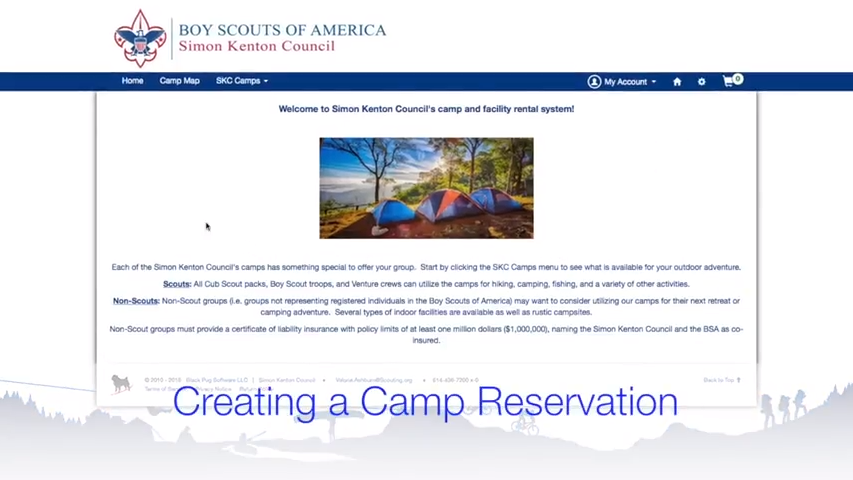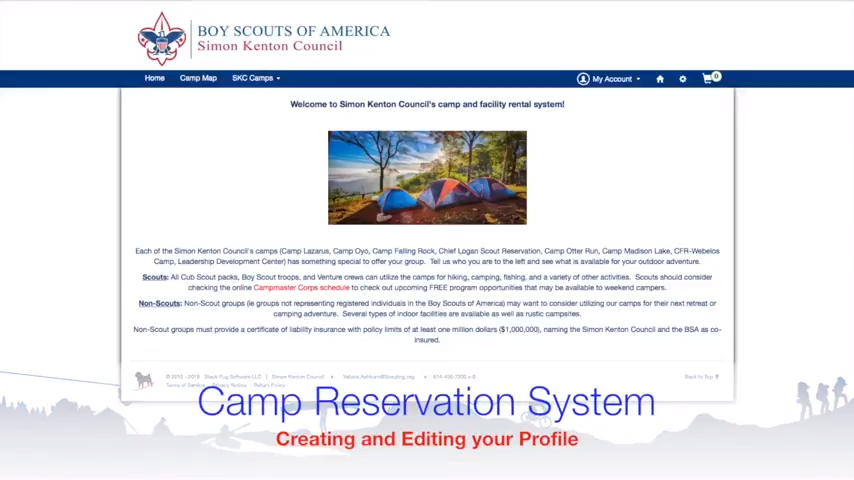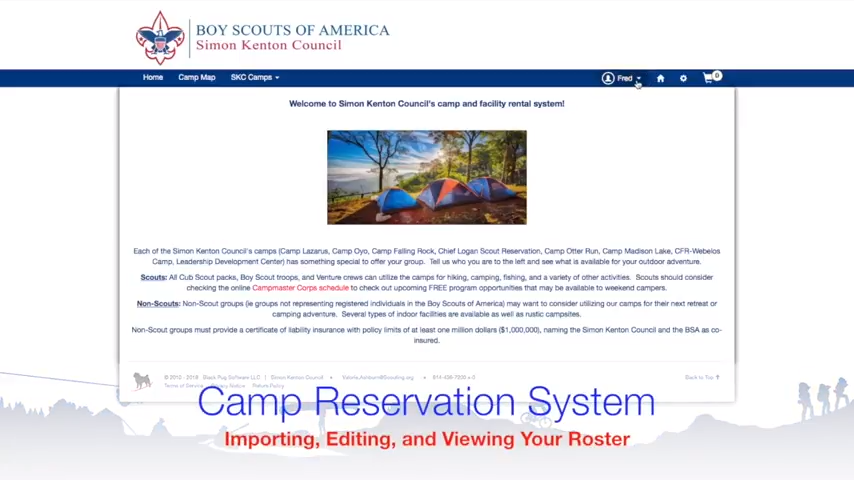Nestled in the middle of the Nicolet National Forest in northeastern Wisconsin, Bear Paw Scout Camp consists of 317 acres of wilderness and is a treasure of Scouting fun in a wonderful natural setting. Serving Boy Scouts since 1946, Bear Paw exposes thousands of Scouts each year to the wonders of nature by hosting camporees, unit camping, and a fabulous summer camp program.
Campers have unlimited opportunities to hike, fish, mountain bike, canoe, sail, swim, and enjoy nature at its finest! Additional programs offered are designed to help each Scout toward Eagle rank.
During the winter season snowshoe, ice skating and ice fishing are just some of the featured activities.
powered by Ambient Weather
Bay-Lakes Council Camps prohibits groups from bringing firewood to camp. Emerald Ash Borer (EAB) has been detected in Wisconsin. Please let all people coming to camp know that no firewood will be permitted on camp property. Any wood that is lying on the ground or is "dead" in the woods is free to use.
Bear Paw Scout Camp
14000 Bear Paw Camp Lane
Mountain, WI 54149
Exactly 3 miles East of Mountain on County Hwy W OR exactly 3.5 miles West of Crooked Lake on County Hwy W,
Turn South on Bear Paw Road (NF 2630).
After crossing the Waupee Creek Bridge (1.5miles), take the Right Fork for 1/2 mile to Camp.
Day
08:00 AM
08:00 PM
Night
04:00 PM
03:00 PM
Short Term & Weekend Camping Procedures
The Bay-Lakes Council, Boy Scouts of America needs your help in following the procedures listed below.
Two-deep Leadership
Two registered adult leaders or one registered leader and a parent of a participant, one of whom must be 21 years of age or older, are required on all trips and outings. The Chartered Organization is responsible for ensuring that sufficient leadership is provided for all activities.
For Cub Scout Outings: At least one adult must have completed BALOO (Basic Adult Leader Outdoor Orientation). A minimum of one adult is required to be Youth Protection Trained. It only takes a couple of minutes to become Youth Protection Trained. Go to www.My.Scouting.org, log in or create an account. On the homepage, scroll down to see and click the Take Youth Protection Training Button.
For Co-ed Outings: Appropriate adult leadership must be present for all overnight Scouting activities; even those including parent and child, require male and female adult leaders, both of whom must be 21 years of age or older, and one of whom must be a registered member of the BSA. The chartered organization is responsible for ensuring that sufficient leadership is provided for all activities.
Respect of Privacy
Adult leaders must respect the privacy of youth members in situations such as changing clothes and taking showers at camp, and intrude only to the extent that health and safety requires. Adults must protect their privacy in similar situations.
Single-room or dormitory type accommodations for Scouting Units
- Adults must establish separation barriers or privacy zones such as a temporary blanket or sheet walls in order to keep their sleeping area and dressing area separated from the youth.
- Male and female leaders require separate sleeping facilities. Married couples may share the same quarters if appropriate facilities are available.
- Male and female youth participants will not share the same sleeping facility.
- When staying in tents, no youth will stay in the tent of an adult other than his/hers parent or guardian.
Buddy System
The buddy system is required for all aquatic activities and strongly encouraged for all camp outings. Assign a buddy to each person for the duration of the stay. Be sure all travel in and around the camp is in groups of two or more.
Drug, Alcohol, Tobacco Use and Abuse
The Boy Scouts of America prohibits the use of alcoholic beverages and controlled substances at encampments or activities on property owned and/or operated by the Bay-Lakes Council, Boy Scouts of America, or at any activity involving participation of youth members.
Adult leaders should support the attitude that young adults are better off without tobacco and may not allow the use of tobacco products at any BSA activity involving youth participants. All Scouting functions, meetings, and activities should be conducted on a smoke-free basis, with smoking areas located away from all participants (see the Camp Ranger or Campmaster for designated smoking areas in camp.) All Council owned facilities are smoke free environments, including e-cigarettes.
First Aid
It is important that one person in each group be trained in the principles of first aid and CPR, and know how and when to put this knowledge to the best use. They should have a thorough understanding of the limitations of this knowledge. In addition, each group should have a first aid kit in their possession at all times.
Reporting Injuries
For any and all types of injuries, reporting them to the Camp Ranger or Campmaster is required. Each camp has a health log that is to be used when an injury occurs. Health logs are available through the Camp Ranger or Campmaster, who is responsible for recording any accidents.
Annual Health and Medical Records
Each BSA camper is required to have a health history on file with the Unit leader. This includes parents and non-Scouts who may be in camp with a Unit. These forms are available at the Bay-Lakes Council, Center for Scouting or the Council website: www.baylakesbsa.org. Click on the Resources tab and then click the Forms & Resources menu.
Liquid Fuels
Knowledgeable adult supervision must be provided when Scouts are involved in the storage and handling of liquid fuels. The filling of stoves or lanterns must be done by adults. The use of liquid fuels for starting any type of fire is prohibited. Only flashlights and electric lanterns are permitted in tents. “No flames in tents” is a rule that must be enforced. Obey all fire laws, ordinances and regulations. The Camp Ranger or Campmaster can give you the most current guidelines on these topics.
Fireworks
The Boy Scouts of America prohibits the securing, use and display of fireworks in conjunction with programs and activities on or off Council properties.
Guns and Firearms
Except for law enforcement officers required to carry firearms within their jurisdiction, firearms shall not be brought on camping, hiking, backpacking, or other Scouting activities except those specifically planned for target shooting under the supervision of a certified BSA or National Rifle Association firearms instructor.
Unauthorized and Restricted Activities
The following activities have been declared unauthorized and restricted by the Boy Scouts of America:
- All-Terrain Vehicles
- Fireworks
- Motorized go-carts and motorbike activities for Cub Scout and Scouts BSA programs
- The activity commonly referred to as “War Games” – in which one individual shoots paint or dye at another individual.
- Hunting, although hunting safety is part of the program curriculum.
- Sledding with steel runner sleds.
- Squirt guns and water balloons
For a complete listing of unauthorized and restricted activities, refer to the Guide for Safe Scouting.
Safe Swim Defense/Safety Afloat
Swimming during a Boy Scouts of America activity is only allowed when the following conditions are met:
Safe Swim Defense
- Qualified Supervision: All swimming activity must be supervised by a mature and conscientious adult over 21 years of age who understands and knowingly accepts his or her responsibility for the well-being and safety of the children in his or her care, who is experienced in the water and confident of his or her ability to respond in the event of an emergency, and who is trained in and committed to compliance with the eight points of BSA Safe Swim Defense. (It is strongly recommended that all Units have at least one adult or older youth member currently certified as a BSA Lifeguard to assist in the planning and conducting of all swimming activities).
- Physical Fitness: Require evidence of fitness for swimming activity with complete Health History form signed by a physician, parent or legal guardian. Each participant must have a signed health history form to participate.
- Safe Area: Lifeguards inspect bottom of swimming area and set proper areas for three swim groups. (Non-swimmer, beginner and swimmer).
- Lifeguard on Duty: Appoint two capable swimmers as lifeguards.
- Lookout: Station lookout on shore with view of complete swim area.
- Ability Groups: Divide into three ability groups; Non-swimmers, Beginners, and Swimmers. Keep each group in its own area.
- Buddy System: Pair everyone with another in their own ability group. Buddies check in and out together. Hold buddy check every 10 minutes.
- Discipline: Explain safety rules (running, diving, pushing, etc.) and enforce them.
Safety Afloat
All activity afloat must be supervised by a mature and conscientious adult over 21 years of age who understands and knowingly accepts his responsibility for the well-being and safety of the children in his or her care, who is experienced and qualified in the particular watercraft skills and equipment involved in the activity and who is committed to compliance with the nine points of BSA Safety Afloat.
One supervisor is required for each 10 people, with a minimum of two adults for any one group. For Cub Scouts the ratio is one adult per five boys. All supervisors must complete BSA Safety Afloat and Safe Swim Defense training and at least one must be certified in CPR. (It is strongly recommended that all Units have at least one adult or older youth member currently certified as a BSA Lifeguard to assist in the planning and conducting of all activity afloat).
- Qualified Supervision: All swimming activity must be supervised by a mature and conscientious adult over 21 years of age who understands and knowingly accepts his or her responsibility for the well-being and safety of the children in his or her care, who is experienced in the water and confident of his or her ability to respond in the event of an emergency, and who is trained in and committed to compliance with the eight points of BSA Safe Swim Defense. (It is strongly recommended that all Units have at least one adult or older youth member currently certified as a BSA Lifeguard to assist in the planning and conducting of all swimming activities).
- Physical Fitness: Require evidence of fitness for swimming activity with complete Health History form signed by a physician, parent or legal guardian. Each participant must have a signed health history form to participate.
- Swimming Ability: Only swimmers, those who can swim 100 yards, are allowed in boats/canoes. Non-swimmers or beginners are allowed in boats/canoes ONLY with an ADULT SWIMMER.
- Personal Floatation Device (PFD): Properly worn by all non-swimmers and beginners. Swimmers may store PFD within easy reach.
- Buddy System: Pair everyone with another in their own ability group. Buddies check in and out together. Hold buddy check every 10 minutes.
- Skill Proficiency: Handling skills, safety and emergency procedures explained.
- Planning: Adult lifeguards must be informed of where you are going and how long you will be gone.
- Equipment: All equipment must meet State, Federal and BSA regulations.
- Discipline: Explain safety rules and enforce them.
Camping Guidelines
Family Camping: Family camping is an outdoor experience, other than resident camping, that involves Cub Scouting, Scouts BSA, or Venturing program elements in an overnight setting with two or more family members, including at least one registered BSA member of that family. Parents are responsible for the supervision of their children and Youth Protection guidelines apply.
Recreational Family Camping: When Scouting family’s camp, as a family Unit, outside of an organized program. It is a non-structured camping experience, but is conducted within a Scouting framework on local Council-owned property.
Cub Scout Pack Overnighters: These are Pack organized events involving more than one family from a single Cub Scout Pack, focused on age-appropriate Cub Council-approved locations. If non-members, siblings participate, the event must be structured accordingly to accommodate them. All youth participants are responsible to a specific adult.
Adults giving leadership to Cub Scout Pack overnighters must complete Basic Leader Outdoor Orientation (BALOO) to properly understand the importance of program intent, youth protection, health and safety, site selection, age-appropriate activities, and sufficient adult participation.
Scouts BSA Camping: Registered members of Scouts BSA Troops are eligible to participate in Troop or Patrol overnight campouts, camporees, and resident camps, provided all leadership standards and other BSA guidelines are met.
If a well-meaning leader or parent brings along a child who does not meet these age guidelines, disservice is done to the Unit because of distractions often caused by younger children. A disservice is done to the child, who is not trained to participate in such activity and whom, as a non-member of the group, the older campers may ignore.
Polar Bear Camping: The Bay-Lakes Council challenges Units to earn the Polar Bear Camping Award for those persons who challenge the winter weather. The requirements are:
- Set-up a tent or build a man-made shelter in the outdoors and occupy the shelter for a period of 24 hours, with temperatures being 32°F or less.
- Actively participate in the planned program of the group remaining outside or in the shelter as much as possible.
- Complete the requirements between fall and winter of the current year into spring of the next year.
Upon approval from the Unit leader, the participant earns the polar bear patch. These patches are available for sale through the Center for Scouting Program Department. Orders must be placed by May 1st using the Polar Bear Award Order form which can be found on the Bay-Lakes Council website; www.baylakesbsa.org.
|
For Camping Opportunities other than Summer Camp.... Please check in with Camp Ranger and/or the Campmaster upon arrival. The State of Wisconsin requires that a record of all attendees be kept for a total of 3 years. Please bring a roster of ALL who stay overnight, you must include complete addresses & phone numbers. |
|
For Campers in one of our Cabins or Lodges - Please find and use the CLEANING CHECKLIST listing the tasks to be completed before leaving / checking out. |
|
For our Campsite users, please make sure the latrine is clean, the site has been policed and garbage cans emptied, with all the campsite tools, fire barrel and garbage can secured inside the site latrine. |
| If you have any questions, feel free to check with the Camp Ranger and/or Campmaster. |
| Please return the Customer Check Out Report and your Roster (with names, addresses and phone numbers of all who stayed overnight), to the Camp Ranger and/or the Campmaster before leaving Camp. |
| Please consider completing a "How We Are Doing" Survey - this helps us improve Camp. (Theres a QR code also) |
| We hope you had a great time here at Bear Paw Scout Camp and hope you have plans to return soon. Please be sure to check out the Camp Facebook page for updates and pictures. |
There is a 10% operations fee on all cancelations made less than one year but at least 90 days before the reservation start date.
There is a 30% operations fee on all cancelations made less than 90 days but at least 30 days before the reservation start date.
There is a 60% operations fee on all cancelations made less than 30 days but at least 7 days before the reservation start date.
There is a 100% operations fee on all cancelations made less than 7 days before the reservation start date.
| If cancelation is received 365 days or more prior to the the start date of the reservation | 100% will be refunded |
| If cancelation is received less than 365 days but at least 90 days prior to the start date of the reservation | 90% will be refunded |
| If cancelation is received less than 90 days but at least 30 days prior to the start date of the reservation | 70% will be refunded |
| If cancelation is received less than 30 days but at least 7 days prior to the start date of the reservation | 40% will be refunded |
| If cancelation is received less than 7 days prior to the start date of the reservation | 0% will be refunded |
We agree that failure to clean the facilities prior to leaving will result in the cleaning fee being added to our total payment due.









































